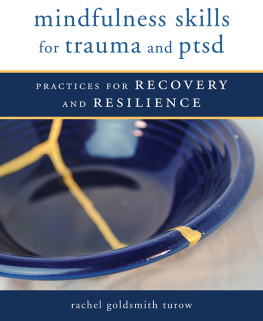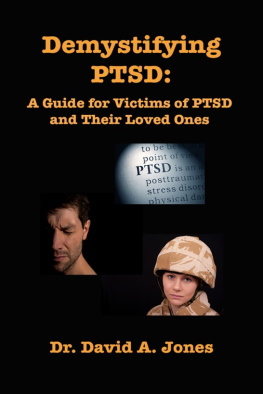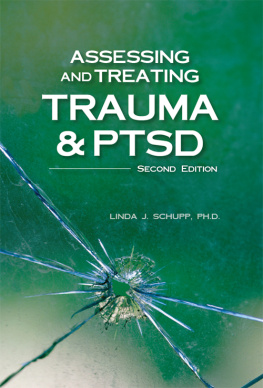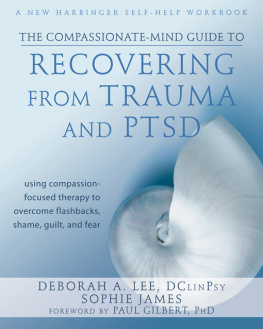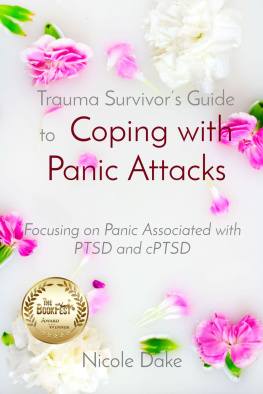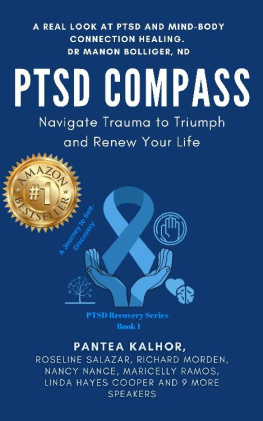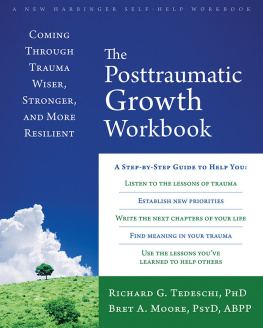This book includes firsthand accounts of a number of courageous people who have endured extreme or potentially traumatic events. With the exception of Jed McGiffin and Maren Westphal, I have altered their names and personal details to preserve confidentiality.
I first met Jed when he interviewed for the doctoral program in clinical psychology at Columbia Universitys Teachers College, where Im a professor. Like most of the candidates I met that day, Jed was well dressed and respectful as he walked into my office. The fact that he walked into my office came as a bit of a surprise, though. I knew that Jed had been in a terrible accident that had almost killed him. I wasnt sure he was going to be able to walk.
Jed didnt say much about the accident that day. There were lots of other things to talk about. It wasnt until quite a while later that I learned the full story.
Five years earlier, Jed had been trying to make a living as a musician in New York. No small feat. As he put it, I was a musician who was necessarily a waiter. Although he had been working at one of New Yorks finest restaurants, Babbo Ristorante in Greenwich Village, he was looking to make a change. He had just moved in with his girlfriend, Megan. She was studying nursing. Jed began to think about his longtime interest in psychology. He took a few classes at City College uptown. It had gone well, and he planned to take a full load the next semester.
Thoughts about the future were circling around in Jeds mind as he completed a long shift on the night of December 21. The restaurant had just closed. It was around 1:30 a.m. Jed headed down to the basement to pick out some wine from the restaurants sommelier as holiday gifts for his family. He found four nice bottles and stowed them away in his backpack before heading out the door.
The night was bitter cold. Jed pulled his hoodie snug and waited on the corner of West Eighth Street. The white light of the walk signal shimmered off the frozen pavement, and Jed made his way into the intersection. A garbage truck came around the corner, sudden and fast, and caught him. Before he knew it, he was down.
I remember the whole thing, vividly, Jed told me. I was knocked down by the front bumper and then pulled under by the front wheels. I went down kind of to the left, you know, my left leg went out, and I got run over by the front wheel.
The front wheel crushed Jeds leg. Then there was a brief pause.
One second.
Two seconds.
And then the trucks two double-axle rear wheels hit him.
The whole twenty-five tons of truck rolled over me.
Oddly, the four wine bottles in Jeds backpack remained intact. But Jeds leg and part of his hip were flattened into a mess of blood and bone. It was a brutal accident. He screamed wildly.
An emergency response team from the fire department was the first to arrive on the scene. They got there remarkably quickly, in a matter of just a few minutes.
Lieutenant Adrian Walsh found Jed and held his hand.
Jed remembers being acutely aware of the danger he was in.
I knew it was life or death. I never passed out. I was screaming. I know I was screaming for a while.
Then he learned that the ambulance that would eventually take him to St. Vincents Hospital was delayed. Although St. Vincents was only six blocks away, the ambulance was locked up in traffic. The wait was excruciating.
It was getting really scary. The fire department showed up and they shut down the whole thing. I very much remember the garbage truck. I could see from where I was lying that theyd stopped up the road, I could remember that really vividly.
Nothing much could be done until the ambulance arrived, but where was it?
There was a lot of yelling. Lieutenant Walsh was yelling. She was trying to find a way to get me to the hospital. They were getting worried. She was yelling to the fire department. She was pointing to her vehicle, yelling, Cant we just put him in this thing, and take him to St. Vincents?
With every minute that ticked by, Jed was in greater and greater danger. He had lost an enormous amount of blood. Lieutenant Walsh later speculated that if there was any luck at all on that fateful night, it was that Jed was lying on the icy cold pavement, which probably slowed the blood loss. Even so, Jed was bleeding profusely. The paramedics had to give him fifty units of blood, nearly five times the bodys normal capacity.
It took twenty-five excruciating minutes for the ambulance to show up. For Jed, it was an eternity. He had no choice but to deal with it.
I remember being sort of meditative on the pavement, like zoned in, maybe following my breath. I dont know what I was doing. I was in shock. There was a lot of furor going on. People were shouting, Put a rush on the bus! The bus is what they called the ambulance. There was this kind woman, Lieutenant Walsh, holding my hand, trying to keep me calm. And I was just kind of doing my best, in a kind of trance.
And then the ambulance arrived. Jed felt a brief sense of relief before a sobering realization set in: I knew, I mean I could tell, moving me was going to be bad. I couldnt move and they were going to be moving the thing that really hurt, a lot. And then they started shuffling me around and lifted me up.
Jed remained fully conscious through the whole episode: It was mind-bending pain. You know, like everything goes white. I think I probably howled quite a bit from there to St. Vincents. Thats where things start to fade, because of the pain, my consciousness started to fade.
The ambulance ride to St. Vincents was short, and the ambulance was practically flying. Jed was screaming for pain medication. He had still not yet received anything to numb his agony. There was no time.


